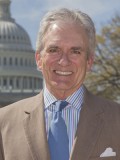
 By Executive Director J. Brent Walker
By Executive Director J. Brent Walker
So, how could the Baptist Joint Committee for Religious Liberty file a friend-of-the-court brief in the Zubik case on the side of the government, against the Little Sisters of the Poor and the other religiously affiliated nonprofits (“petitioners”)? It’s a fair question that church-state observers, the national media and even BJC supporters could legitimately ask. After all, this is the first free exercise case, unalloyed with Establishment Clause issues, in which the BJC and religious liberty advocate Douglas Laycock have supported the government’s position at the U.S. Supreme Court.
The BJC’s brief, written by Professor Laycock and BJC General Counsel Holly Hollman, is pro-free exercise — both in this case and in the long run.
As we often have argued, religious liberty is sometimes thwarted by government hostility or inattention; but it can also be endangered by over-the-top, all-or-nothing demands from those who claim their liberty is being denied. That’s what is happening in this case.
Petitioners say that the exemption given to religiously affiliated nonprofits — requiring them to object to providing contraceptive coverage and permitting the government to do a work-around with a secular insurance company — is a “substantial burden” on their exercise of religion, as they are required to show by the federal Religious Freedom Restoration Act (“RFRA”). Petitioners argue that they, unilaterally, are entitled to define what a substantial burden is. This is not so. While courts typically take the religious claimants’ word for the sincerity of religious belief, the claimants do not have carte blanche to define the substantiality of the burden on religious exercise. Only the courts can, and should, make that determination. While beliefs are inviolable and personal, exercising those beliefs often impacts the rights of others and must be weighed accordingly. In this case, petitioners’ refusal to take “yes” for an answer — being relieved from having to provide, pay for or even appear to approve of insurance coverage they deem objectionable — is arguably not even a burden, much less a substantial one, and yet would directly harm the rights of employees.
To allow all religious claims to go forward without a meaningful review of substantiality would not only flout the terms of RFRA, but intensify the cultural and political pushback that we are already starting to see both in Congress and in the states. This will assuredly prejudice legitimate claims for religious liberty.
Petitioners also claim the law’s outright exemption given to houses of worship and their integrated auxiliaries must include religiously affiliated nonprofits like social service agencies, colleges, universities and hospitals.
Specific legislative and administrative exemptions lifting burdens from the exercise of religion are important in protecting religious liberty. But, they should be tailored to the needs of potential religious claimants. Indeed, throughout the law, houses of worship are often treated differently from religiously affiliated nonprofits. This is seen in many of our tax laws and also in defining who properly may receive government grants. Religious affiliates employ vastly more employees who would be harmed if not covered, and such employers are less likely than houses of worship and other pervasively religious auxiliaries to hire only co-religionists who agree with them on contraception.
If Congress and state legislatures are unable to provide narrowly tailored exemptions without fear that the courts will expand them beyond their intended boundaries, they will be far less likely to provide any exemptions at all. This would be devastating to our religious liberty.
The BJC’s effort in this case was particularly productive and unique. The fact that the BJC and Professor Laycock — both religious liberty hawks who were instrumental in convincing Congress to pass RFRA in 1993 — filed on the side of the government certainly caught the Court’s attention. The BJC brief was specifically mentioned several times in oral argument from the bench and counsel arguing the case. Justice Ruth Bader Ginsburg, in discussing the sufficiency of the accommodation in her final question to petitioners’ counsel, observed:
But going back to that line-drawing problem – and that is in a brief that’s been mentioned several times, the Baptist Joint Committee – our leading proponent of RFRA discusses this line-drawing problem. Do you just say that’s wrong?
Another way in which our out-of-the-ordinary brief attracted attention became evident when I addressed the media on the plaza in front of the Supreme Court building after the oral argument. My five-minute remarks were the first to articulate our position after a succession of several speakers, including a group of nuns and others. I was pleased our views were disseminated not only on C-SPAN, but other media outlets such as Nina Totenberg’s evening drive-time coverage on NPR and NBC’s feed for local affiliates throughout the country.
Our advocacy for religious liberty through filing friend-of-the-court briefs in the highest court of the land provides a highly visible forum to educate the public as much as to instruct the justices about our understanding of the proper interpretation of laws ensuring religious liberty. The BJC and Professor Laycock have worked together for nearly three decades to articulate and defend a proper interpretation of the First Amendment, RFRA and similar state constitutional provisions and legislation. Our work in this important case continues that mission.
Check out our podcast with more from Brent Walker on the oral arguments in the Zubik case.
From the April 2016 edition of Report from the Capital. Click here to view the issue as a PDF document.




